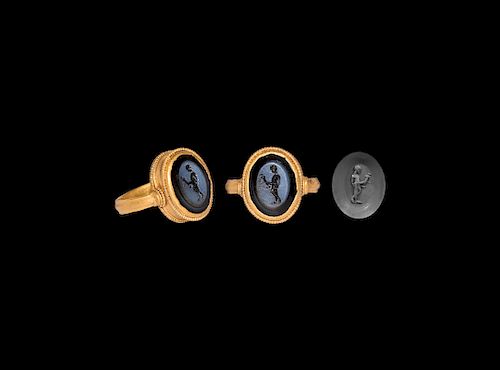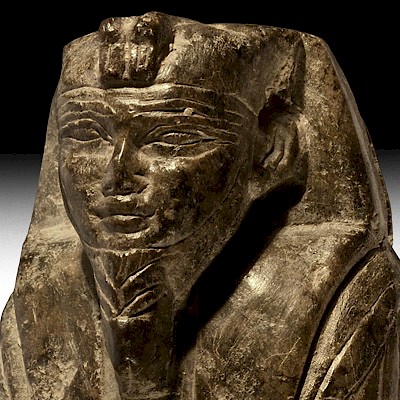Roman Gold Ring with Theseus Intaglio Gemstone
Lot 133
About Seller
TimeLine Auctions Limited
The Court House, 363 Main Road
Harwick, Essex CO12 4DN
United Kingdom
Estimate:
GBP£1,800 - GBP£2,400
$2,432.43 - $3,243.24
Absentee vs Live bid
Two ways to bid:
- Leave a max absentee bid and the platform will bid on your behalf up to your maximum bid during the live auction.
- Bid live during the auction and your bids will be submitted real-time to the auctioneer.
Bid Increments
| Price | Bid Increment |
|---|---|
| GBP£0 | GBP£5 |
| GBP£100 | GBP£10 |
| GBP£200 | GBP£20 |
| GBP£500 | GBP£50 |
| GBP£1,000 | GBP£100 |
| GBP£2,000 | GBP£200 |
| GBP£5,000 | GBP£500 |
| GBP£10,000 | GBP£1,000 |
| GBP£20,000 | GBP£2,000 |
| GBP£50,000 | GBP£5,000 |
| GBP£100,000 | GBP£10,000 |
| GBP£250,000 | GBP£20,000 |
About Auction
By TimeLine Auctions Limited
Feb 26, 2019
Set Reminder
2019-02-26 05:00:00
2019-02-26 05:00:00
America/New_York
Bidsquare
Bidsquare : TimeLine Auctions - Antiquities Sale - Day 1
https://www.bidsquare.com/auctions/timeline-auctions-limited/timeline-auctions---antiquities-sale---day-1-3821
Auction Venue: The May Fair Hotel London Stratton Street Mayfair London, W1J 8LT Viewing from noon Monday 25th February 2019 Champagne Reception: 6pm - 9pm Tuesday 26th February 2019 (Day 1) 10am : Lots 1 - 660 TimeLine Auctions Limited enquiries@timelineauctions.com
Auction Venue: The May Fair Hotel London Stratton Street Mayfair London, W1J 8LT Viewing from noon Monday 25th February 2019 Champagne Reception: 6pm - 9pm Tuesday 26th February 2019 (Day 1) 10am : Lots 1 - 660 TimeLine Auctions Limited enquiries@timelineauctions.com
- Lot Description
1st-3rd century AD. A D-section gold hoop with flat borders and flared shoulders supporting a discoid bezel with beaded wire trim, inset blue nicolo gemstone of the figure of Theseus holding his father's sword. Cf. seal ring in British Museum, accession number 1924,0514.4. 5.40 grams, 21mm overall, 14.13mm internal diameter (approximate size British F 1/2, USA 3, Europe 4.3, Japan 4) (3/4"). Ex Horton collection; formerly in an important London collection since the 1970s. Theseus was one of the greatest and most popular heroes of Greek mythology and is closely associated with the city-state of Athens. His father Aegeus was concerned as he had no heirs, so he consulted the famous oracle at Delphi for advice; the Oracle pronounced: 'Do not loosen the bulging mouth of the wineskin until you have reached the height of Athens, lest you die of grief.', a cryptic message that Aegeus did not understand. The oracle then told Aegeus to visit Pittheus, king of Troezen, a small city south of Athens as he was famous for his wisdom and skill at expounding oracles. Pittheus understood the prophecy and introduced Aegeus to his daughter, Aethra, when Aegeus was drunk at a banquet held in his honour. But following the instructions of Athena in a dream, Aethra left the sleeping Aegeus and waded across to the island of Sphairia. There she poured a libation to Poseidon and was possessed by the sea god in the night and conceived Theseus. This gave Theseus a combination of divine as well as mortal characteristics in his nature and such double paternity, with one immortal and one mortal, was a familiar feature of other Greek heroes. After Aethra became pregnant, Aegeus left her and decided to return to Athens where he married the sorceress Medea. Before leaving, he buried his sandals and sword under a huge rock and told Aethra that when their son grew up, he should move the rock, if he was heroic enough, and take them for himself as evidence of his royal parentage. When Theseus grew to manhood, he moved the rock and recovered his father's tokens, examining them for signs of their ownership. His mother then told him the truth about his father's identity and that he must take the sword and sandals back to king Aegeus to claim his birthright. On his way to Athens he carried out his first heroic deeds, known as the Six Labours. Theseus is also known for many other adventures and was one of the Argonauts, however, he is more famous for slaying the Minotaur at the Labyrinth of Crete. [A video of this item is available to view on TimeLine Auctions website.]Very fine condition.
Condition
- Shipping Info
-
Buyer Pays Shipping Costs
-
- Buyer's Premium



 EUR
EUR CAD
CAD AUD
AUD GBP
GBP MXN
MXN HKD
HKD CNY
CNY MYR
MYR SEK
SEK SGD
SGD CHF
CHF THB
THB



